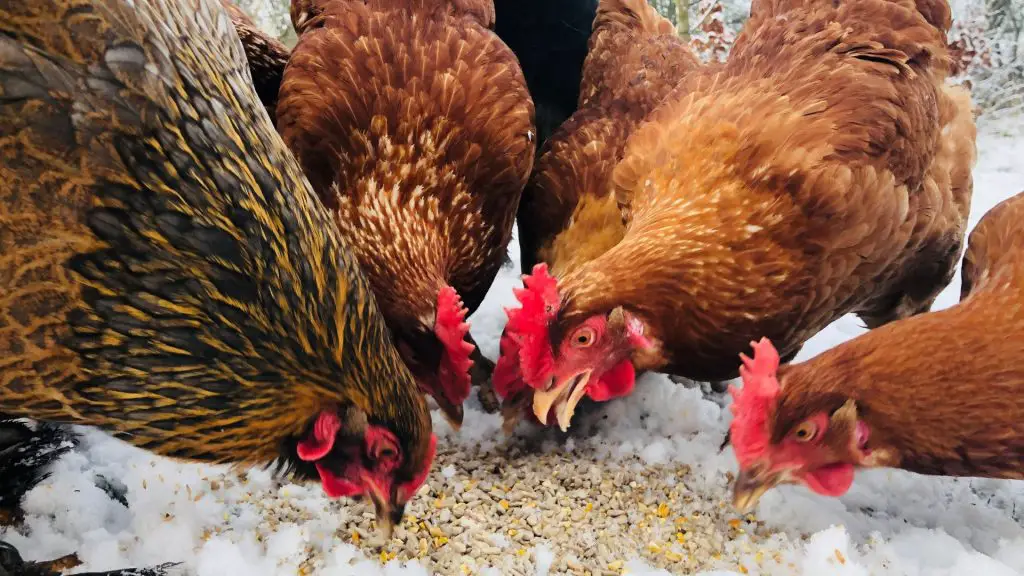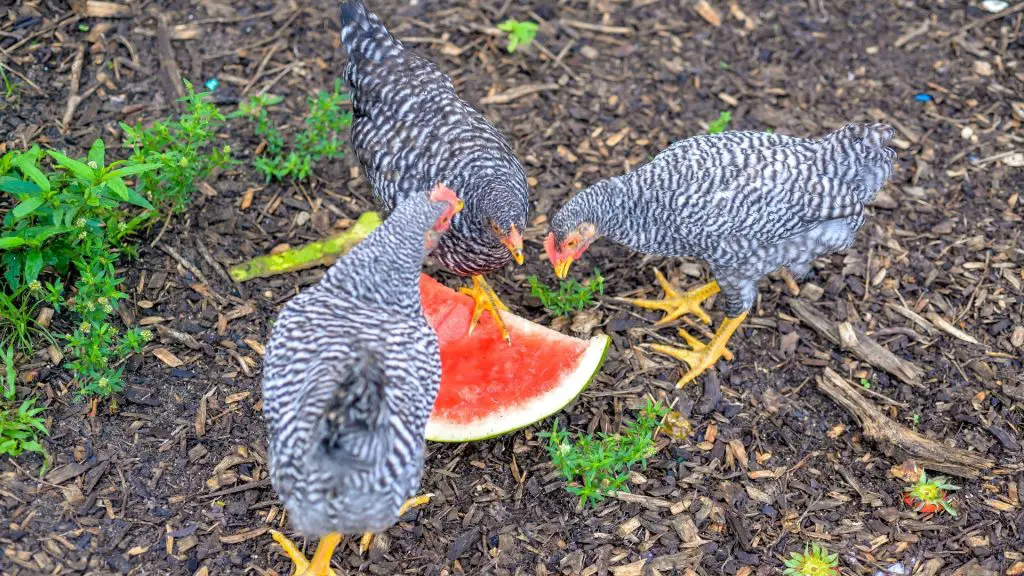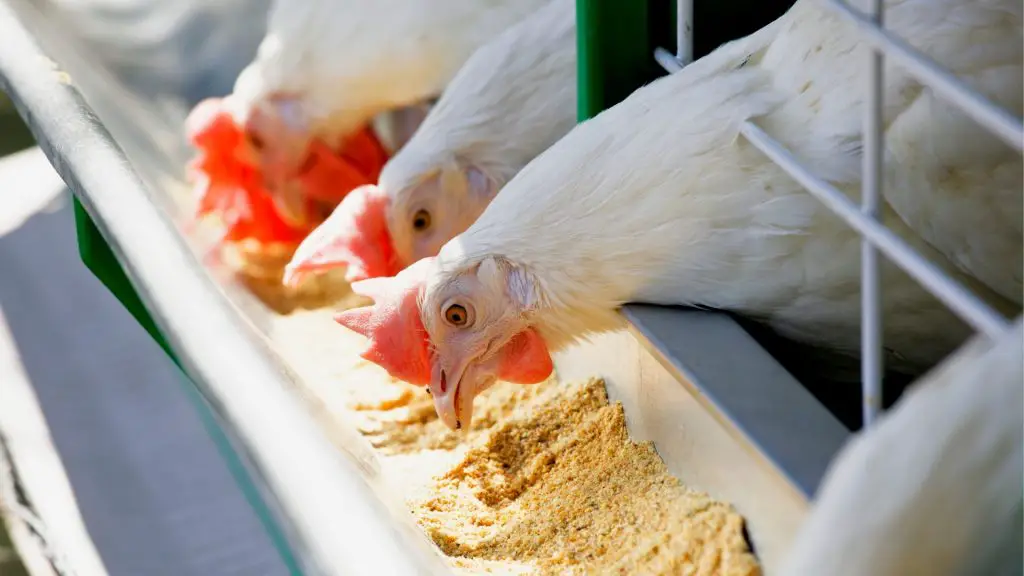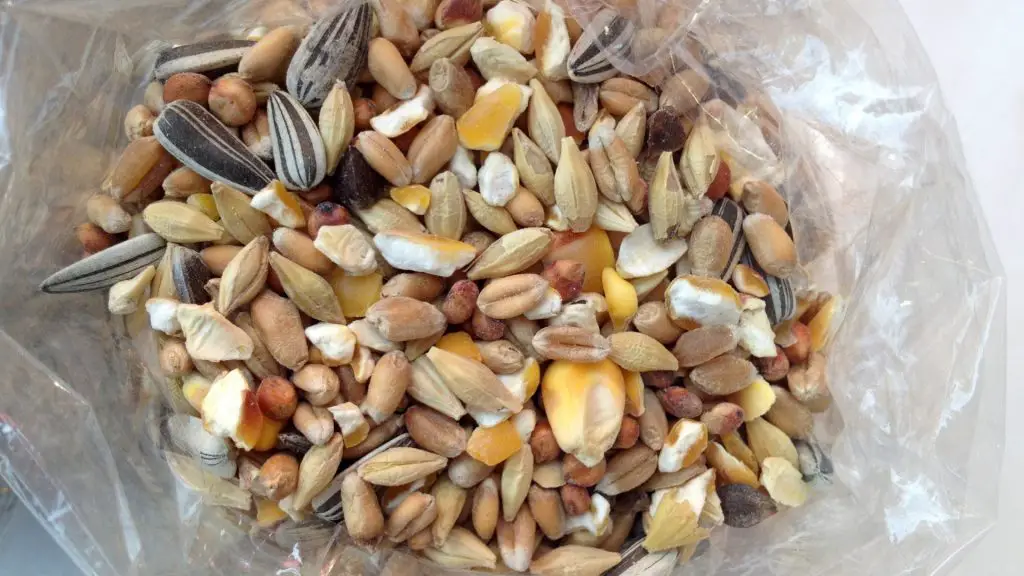If you want a pastime that also gives you free eggs regularly, then raising backyard chickens may be a good option. But that only means you should find out what food chickens eat throughout each of their growth stages. The good news is that feeding chickens are not that hard.
What to feed backyard chickens? You can feed backyard chickens with table scraps, fruits, grains, greens, or age-appropriate layer feeds. Supplemental mash, pellets, or other feeds are best used when foraging is insufficient. Avoid giving chickens foods that are high in sugar, fat, or salt.
In this article, we’ll highlight the specific do’s and don’ts to follow when feeding your backyard chickens. This will also explain what chickens love to eat, what they should avoid eating, what types of chicken feed are available, and more.
How Does a Chicken Eat?

Chickens barely chew before swallowing—in part because they lack teeth, but also because they need to demobilize their prey as soon as possible. Food is then stored in their crop, goes down the stomach where digestion begins, and down into the small intestines where the nutrients are absorbed.
What Is a Chicken’s Favorite Food?

A chicken’s favorite foods include most fruits, grains, and greens that are available in an average garden. Chickens will also enjoy eating common staples from your pantries, such as bread and rice, but these options should be offered in moderation.
Chickens follow an omnivorous diet, meaning they eat both plants and animals. They are also usually averse to bitter taste food but are curious enough to try whatever plant or small animals they might see in your garden and see what sticks.
You may be surprised to discover that you and your chickens share several favorite food selections. This is a good thing because this means you will be able to feed them with table scraps. You save on chicken feeds and reduce food waste at the same time. Aren’t chickens just the perfect backyard companions?
Just a quick caveat: Make sure you are allowed to keep chickens in your backyards, as some states do not allow raising chickens in residential zones.
Backyard chickens are generally able to survive through foraging. However, this may not always be possible during winter. Chickens will surely miss having greens or the typical tiny insects and juicy worms abundant in the summer season. Owners will need to be proactive in helping them balance their diets during this season.
Do Chickens Eat Chicken?
Chickens do eat chicken as well as other meats like beef and pork, and eating chickens on occasion doesn’t necessarily harm them. They can also eat other meats like pork and beef, but as with chicken meat, you will have to cook them first, or your backyard chickens may be at risk for food poisoning.
Chickens can also eat uncooked fish, including canned varieties.
Do Chickens Need Commercial Feeds?
Chickens may need commercial feeds during the winter when foraging is not enough to fill their small bellies or provide them with adequate nutrition. They may also need more specific food varieties once they reach a certain age and require multivitamins to remain healthy and produce healthy eggs.
These considerations make it an ideal move to purchase chicken feeds appropriate for their age and nutritional needs. The different feed types are not complex. Simply knowing how old the chickens are is usually sufficient to identify which feed types are best to feed them with.
Consuming the right feed ensures that they remain healthy even during the molting and egg-laying seasons.
What Is a Chicken Starter Feed?

Chicken starter feed is a processed foodstuff made to have high protein components ranging between 20% and 24%, which is considered ideal for growing chickens. They are also high in calcium, helping chickens develop strong bones.
The amount of protein in their diet is crucial in ensuring they do not lag behind their nutritional requirements or go overboard. For instance, when baby chickens consume food that’s too high in protein, they may lay eggs prematurely, affecting their overall health and lifespan.
What Is Chicken Mash?
Chicken mash contains the basic ingredients needed for baby chickens to grow healthy. It is a fine variety of chicken feeds, making it easy to digest for the chicks. When served, it can also be mixed with water.
The low protein component of chicken mash also protects younger chickens from the premature laying of eggs. Too much protein intake at an early age can also lead to organ damage, so breeders must be careful with their chickens’ food components at this stage.
What Is Chicken Crumble Feed?
Chicken crumble feed is a coarser variety of chicken feed used to help growing chickens transition from mash varieties into compact pellets. Usually, these feeds come from compacted pellets that are crushed to a texture that is not as fine as mashed and is easily digestible by backyard chickens.
What Pellets to Use for Chicken?
Pellets to use for chickens should have high protein and calcium contents and must also contain Omega-3. All of these components help grown backyard chickens remain healthy, lay eggs at a healthy pace, and develop strong shells to prevent eggs from easily breaking before collection.
What Is Chicken Scratch?

Chicken scratch combines raw seeds and other grains that are both treats and a good energy source for your backyard chickens. Its name comes from the chickens’ tendency to keep scratching the ground to look for this seed-grain combination until they are sure they have eaten the last piece.
- WHOLE INGREDIENTS: Manna Pro Harvest Delight is the perfect whole...
- HARVEST MIX: Crafted with whole grains, peanuts, raisins,...
- BENEFICIAL: Manna Pro Harvest Delight contains our unique Flock...
- MIXED FLOCK: This poultry treat is suitable for chickens,...
- VEGETARIAN PROTEIN: Our veggie and grain blend provides 14%...
Backyard chickens generally love chicken scratch. This means they will likely keep on consuming them until they run out. Hence, feeders must ensure that they only give their chickens a sufficient amount at a time. More than an adequate amount may lead to weight gain, and eventually, obesity.
Food Selections to Be Avoided
There’s no need to memorize a long list of specific foods to avoid feeding backyard chickens, just a few specifically high-risk foods that cause serious impacts to chickens. Usually, these foods are also readily available in the household or your backyard. That’s all the more reasons that they must take note of.
- Backyard chickens must not be fed foods loaded with fat, sugar, and salt. Spoiled foods must not also be fed, as well those that are already showing visible molds. These selections leave them at risk of food poisoning.
- When using pesticides, make sure that your backyard chickens are not left with the remains of the target organisms. They might eat them and get poisoned from residual pesticides.
- Make it a habit to regularly replace the water in their water feeder, especially during the summer. Stagnant water and high temperatures make a perfect recipe for blue-green algae’s favorite environment. When chickens drink water contaminated with blue-green algae, they may suffer from various cyanotoxins that cause serious health effects, at times, even leading to death.
Related: What to Know About Chicken Farming? | Explained for Beginners!
Summary
Backyard chickens are generally low-maintenance and are likely to survive and lay eggs as long as you take note of the following:
- Never feed uncooked pork, chicken, or beef to backyard chickens.
- Do not serve them spoiled or moldy food.
- Avoid serving food rich in sugar, salt, and fats.
- Do not overfeed.
- Provide age-appropriate layer feeds, especially during the winter season when foraging is difficult.
As long as backyard chickens receive an adequate amount of protein, calcium, and multivitamin supplements in their diet, owners will likely benefit from a steady supply of eggs throughout their chickens’ lifespan.
List of Sources
Nutrition for Backyard Chicken Flocks

